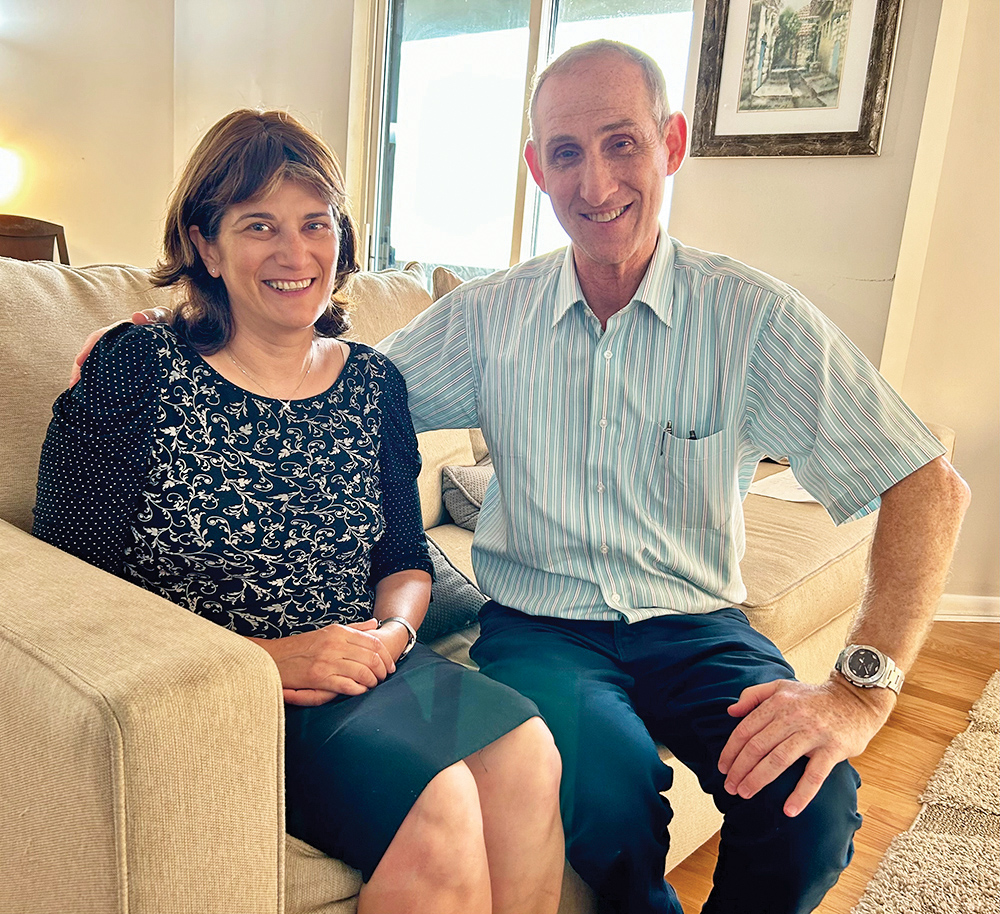
One of the best ways we can appreciate the subtle, not so subtle, and sometimes amusing differences between observant Jewish communities in the United States and in Israel is to ask a couple finishing a long-term visit to the “other” country to comment on their experience.
And that is precisely why I sat down with my new friends Temarah and Yaakov Glick, on Tuesday July 18th, and pestered them for their perspective as they were amidst preparations to return to Israel after a sabbatical year in Highland Park.
Yaakov is a physicist who works for a research institute in Israel and Temarah is a math teacher at a high school for girls. They live in Rechovot and have four children in Israel, three of whom are married.. Their daughter who is working in a post-doctoral program in Seattle assures them that she’s coming back, and they take her at her word.)
Yaakov and Temarah spent the past 12 months living in a high-rise building in Highland Park while Yaakov worked on a sabbatical year project at OFS Labs, a fiber laser company based in New Jersey that was formerly part of Bell Labs.
They graciously responded to my questions about what pleasant surprises and what peculiarities they observed in frum communities here, both in this past year in Highland Park and in a prior sabbatical year in Silver Spring, Maryland.
One thing they marveled about was the support they received from the shul community of Congregation Ahavas Achim in Highland Park.. Yaakov noted that the social emphasis of shul life in America is far different from what they experience in Israel. He added that shuls in America seem more diverse and open to strangers than are shuls in Israel, which he said are often more homogenous and cater to specific hashkafic styles.
As one illustration of their experiences in this vein, Yaakov and Temarah shared that a week into their sabbatical, Yaakov experienced discomfort in his chest and went to the emergency room at Robert Wood Johnson University Hospital, where he was subsequently hospitalized. He and Temarah did not think to tell Ahavas Achim’s Rav, Rabbi Steven Miodownik, about their situation because, after all, they’d only met him recently. Yet 24 hours later, when the news reached him, Rabbi Miodownik was texting them to see what he could do to help.
A community member they’d only recently met at a Shabbos lunch happened to follow up with Temarah on something they discussed. When Temarah told her about Yaakov’s health situation, the community member reacted by persuading one of the reputable cardiac doctors in the area to take on Yaakov’s case, leading to an effective diagnosis and prompt remedy.
Temarah commented on the fact that Shabbos seems far more communal and friend-oriented in the United States. She said that, because Sundays are a work day in Israel, getting that Shabbos nap is of greater importance there. In the United States, she was initially shocked to see how long Shabbos meals went. However, she said she has grown to truly enjoy the extended time with new friends.
Temarah added that often in Israel, people invite one other family to join them for a Shabbos meal; in Highland Park, she attended many meals at which the hosts invited three or four other families.
Asked about what they found peculiar about observant Jewish life in America, Yaakov said that he’s surprised by the level of volunteering in the shul. He recalled that when he served as president of his shul in Israel, five people coordinated all the shul activity, whereas he noticed nearly two dozen people attending a recent board meeting at Ahavas Achim.
He also finds the diversity of dress remarkable in American shuls. In his experience, as Israeli shuls often serve a self-selected section of the frum community, the mode of dress is rather uniform. In an American shul, on the other hand, a fellow in a suit can be seen near a person in Chasidic garb, and both can be seated near someone in more casual clothes.
Temarah and Yaakov joked about how Americans tend to plan ahead much further than Israelis do for Shabbat meals and other social engagements. It’s common to receive a Shabbos invitation in New Jersey a week and a half before the meal, while in Israel Temarah says that it is unremarkable to let a host know on Thursday morning if you plan to join them.
Other differences?
Temarah:“You can’t get proper Israeli cleaning supplies in America!” She needed to have a friend bring her a good Israeli floor rag (smartut) when she visited. She also noted that in Israel the expectation is that homeowners pay a cleaning person a fee for social security and another for their pension; in America, you can ‘get away’ with paying the worker cash without any attention to social security or pension.
Yaakov: “Health-care costs are ridiculous in the US. I received 50 different bills from my hospitalization last year.” He said that wouldn’t happen in Israel. Yes, there is a health care deduction from paychecks in Israel that might seem onerous to Americans. But the resulting care is easier to navigate and far more affordable.
The Highland Park community wishes Temarah and Yaakov a hearty tzeischem l’shalom, and hopes to see them again in their future travels.
Harry Glazer is the Middlesex County Editor of the Jewish Link. He gets to interview really interesting people. He can be reached at [email protected]









